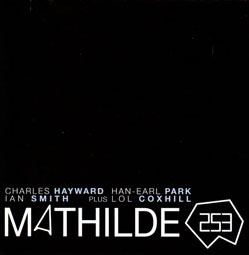
Anyone wishing to keep tabs on Charles Hayward's various activities these days is going to have a hard time of it, as the ex-This Heat drummer plays with countless aggregates and his catalogue quickly swells. This offering is a live recording from London's Cafe Oto during April 2010. I wasn't sure what to expect, not knowing anything about Park or Smith, so the only course of action seemed to dive right in.
After an opening note that sounds like a sax, but is probably Smith's trumpet or flugelhorn, a small flurry of sound rises up with Park stabbing, slapping and wiping his guitar strings while the horn lays out slow melodic lines and Hayward switches between melodica and bells. Perhaps they are just finding a way in, and after 4 minutes or so the trio warm up and wake up, drums and guitar bouncing off each other and Smith's trumpet squiggling about in between. A few minutes later drums and trumpet stop, and Park continues with volume swells of disconnected note-clusters.
Hayward seems impatient though and so the trio interplay starts back up into territory that's not quite free-jazz, not quite stereotypical British free improv, but somewhere in-between, with a slight rock-ist tinge. The stop/start modus continues, little cells erupting, sprawling and then halting, leaving guitar exposed again. Park is the one to pay close attention to here, the development of his ideas is fascinating and very logical, and the other two players are embellishing and commenting on his story. Toward the end of this first piece things congeal and harden, with the guitar returning to its original approach and Hayward thumping into a frenzy. "Similkameen" seems almost ballad-like at first, Smith's horn the leader. Hayward's fractured beats work well here, after some initial stumbling around. "Ishikari" starts out hard but then pulls back a bit. The general approach of the trio might be likened to a bellows, expanding and contracting again and again.
A section in which Smith engages in high frequency squeaks makes my ears prick up, and what follows; ratcheting metallics, ringing scraped cymbals and odd muttering, is quite arresting. Later, on the last two pieces Lol Coxhill's familiar sweet and sour tone joins in, initially in a duet with Park's note-salad, as a carefully considered dialogue begins. Trumpet and drums join quietly and gradually pick up the energy level while continuing in the stop/start mode. Coxhill seems to be having a lot of fun here, rubbing against the other's ideas, or at times suggesting completely different areas for exploration.
Comments and Feedback:
|



